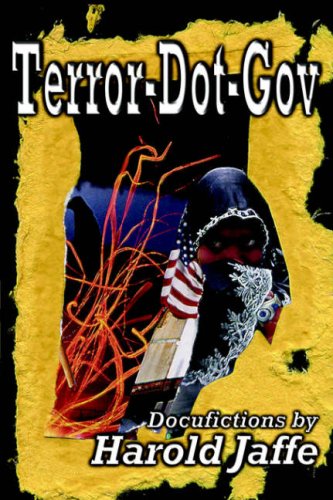The first casualty of any war is truth. You know that. But if you’re wondering why creative nonfiction has eclipsed fiction in so many of the glossy magazines it’s likely because the government has all but cornered the market on inventing stories. Given the current administration’s steadfast refusal to distinguish reality from myth, Harold Jaffe has responded with his own mash-up of news and fiction. Terror-Dot-Gov contains fifteen short stories (which Jaffe calls “docufictions”) drawn from “reconstituted reports and articles from a number of sources” and about the effects the War on Terror has had here on the home front.
“Things to Do During Time of War” is arranged so artfully that the character and plot emerge seemingly out of nowhere:
Send three faxes.
Make six phone calls from your cell while sitting at the terminal.
Access CNN news online.
Another suicide bombing, another helicopter gunship attack, more torture uncovered, another savage beheading, oil prices rising steeply thanks to the Arab oil cartel.
Orange Alert will continue at least through the weekend.
Send for coffee, double latte from Starbucks.
“Sewage” vacillates between descriptions of a U.S.-led effort to create a raw waste treatment plant in Baghdad and an interview with a former Texarkana cop working for the military’s Interrogation division. “We employ all means in our possession,” he says. “That is our charge. You wage a war against the captive’s resistance at every level to show him that he is wrong. That his ideology is bad and sad and not connected to any true religion or civilized discursive system.”What Jaffe lacks in subtlety—one American is alleviating Baghdad’s sewer problems while another is beating the shit out of Iraqis—he makes up for by drawing unique connections (and disconnections). He is up-front about his literary influences, too. Characters called “Theo Adorno” and “G. Lukacs” turn up in “Pizza Cannibal” and there’s someone named “Irigaray” in “Mustache.”
The collection concludes with a dialogue between a Buddhist monk and a suicide bomber and it’s unclear at first who is who:
Do you pray?
Earnestly.
Avidly.
For whom do you pray?
For the long-suffering, the dispossessed. Mothers of murdered children.
Jaffe comes across to me as a good old-fashioned radical leftist, the kind more content to lob Molotov cocktails at barricades than slap anti-Bush stickers on his hybrid and mail $30/year to his local NPR affiliate. Yet he doesn’t sound preachy (despite an author photo that makes him look like a Harley-riding, badass priest) or dogmatic or even overly bombastic. The considerable moral weight of Terror-Dot-Gov derives from its insistence that each of us begin to think for ourselves, even if that means rejecting the lies of the consent-manufacturing news establishment or these very docufictions.
—Andrew Ervin





